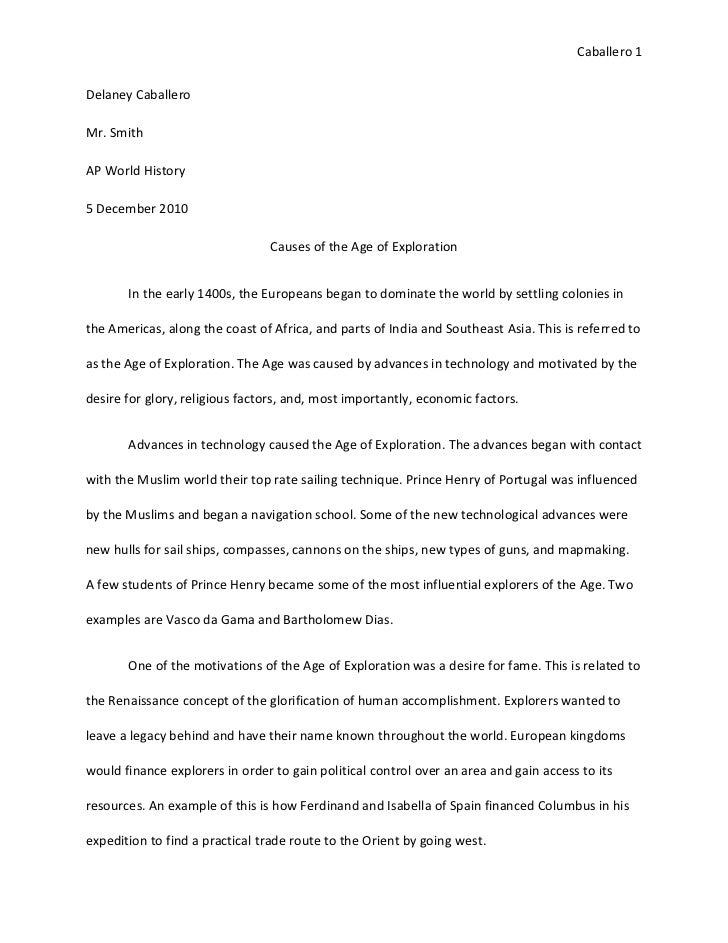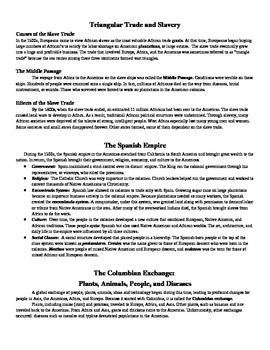
20/01/ · The Age of Exploration and Exchange in - CE, was a catalyst for the colonization of North America. Before this period in history, the Americas were an unknown 10/08/ · Per.3, Ch. 14 October 3, The age of Exploration affected not only Europeans in a positive way but other regions in positive but mostly negative ways. The Age of The Age of Exploration was a period from the early s and continuing into the early s, during which European ships traveled around the world to search for new trade routes to feed
Age of Exploration Essay ⋆ Environment Essay Examples ⋆ EssayEmpire
This Age of Exploration Essay example is published for educational and informational purposes only. If you need a custom essay or research paper on this topic, please use our writing services. com offers reliable custom essay writing services that can help you to receive high grades and impress your professors with the quality of each essay or research paper you hand in. Exploration entailed discovery of unknown lands by a certain culture and recognition of environments favorable for settlement or valuable resources for trade and, ultimately, a market for elaborated products of the metropolis. It normally implied contact with distinct and distant cultures and sometimes with organized political structures so that, depending on the attitude of both parts, the contact could derive into conflict, cooperation, or assimilation.
Exploration also meant confronting harsh environments, storms, famine, thirst, diseases and scurvy in the seas, cold and dry regions, and tropical forests. Exploration has been a key component in the configuration of empires age of exploration essay states, preceding or accompanying political expansion, age of exploration essay. The motivations were a combination of commercial, political, religious, and scientific interests. Discovery and exploration commonly brought parallel progress in the fields of the natural sciences-biology, geology, geography, and anthropology, and determinately influenced innovation and improvement of transportation and navigation systems.
Newly collected information on the territories helped to improve geographical representation on maps and portolans, which in turn favored initiating new explorations and territory reclamation. Portolans were specially decisive for safe navigation; they represented directions, marine routes, principal physical ocean features, and ports. Exploration meant great expenditures, which required private and state investments for supporting presumably long and uncertain journeys, to remunerate manpower and disburse for transportation and navigation resources. The age of exploration designates a phase in the process of European territorial expansion from the 15th to 18th centuries. During this time, Europe had a leading role in geographical exploration, which determinately contributed to connect almost the whole world and shape the geography of lands and seas.
The seven expeditions of Cheng Ho, from tosupported by the expansionist strategy of the Chinese emperor Cheng-tsu, represented an isolated initiative but with a patent exploration mission. Within a tradition of contact and exchange with the Indian Ocean, Cheng Ho led a venture noted for its magnitude as for the lack of continuity. Portugal and Spain took initiative within Europe. First, both became interested in the surrounding seas and discovered the nearer Atlantic islands of the Macaronesia Madeira, Canaries and Azores by midth century.
This area, age of exploration essay, the Atlantic Mediterranean, eventually became the base for future explorations in Africa and America, age of exploration essay. The Portuguese developed a planned program-conceived by Prince Henry of Portugal -which included a school of navigators and cartographers in Sagres, the manufacturing of navigation instruments, a ship-building industry in Faro, and adopted the caravel as a ship for oceanic sailing. They pretended to gain access to the sources of gold and slaves in the western coast of Africa and to the Indian species through an eastern route.
Bartolomeu Dias age of exploration essay the Cape of Good Hope in benefited by the subequatorial Atlantic wind system. It was Vasco da Gama, in an expedition inwho reached India and established an alternative route to that ruled by Arabs through the Red Sea and gave the Portuguese an advantage over the Spaniards. The early diffusion of Islam contributed to the commercial integration of the western Indian Ocean up to Indonesia by the 13th century. When the Portuguese navigator Francisco Serrao reached the Moluccas bya Portuguese monopoly on spices started and changed the situation. Despite this progress, the interior of Africa remained rather unknown to the rest of the world until the 18th century. The most striking discovery in this age was the Spanish expedition of Christopher Columbus in followed by other three voyages in 13 years-searching for an alternative western route to the Indies.
The encounter with America started the colonization of a whole continent by Europeans. Columbus was supported by Isabel, the Queen of Castile, and he used the Canary Islands as a platform to ride on the northeast trades to cross west and the westerlies to return. Columbus was followed by a rapid process of exploration, colonization, and settlement. Hernan Cortes conquered the Aztec empire and explored the New Spain Mexico from toand established the base of the Spanish Empire in America. South America was explored through the Pacific and Atlantic Oceans. By midth century most of the subcontinent was roughly explored.
Francisco Pizarro occupied the Northern Andes; the Southern Andes were explored by Pedro de Valdivia, who reached Chile in ; and Diego de Rojas went through the Chaco and Tucuman age of exploration essay The search for El Dorado, an imaginary land of fabulous age of exploration essay, stimulated the exploration of the inland South America. Francisco de Orellana explored age of exploration essay Amazon between From the Atlantic, Pedro Alvares Cabral initiated age of exploration essay the Portuguese exploration and colonization of Brazil. The rivalry between Spain and Portugal led to age of exploration essay sovereignty conflicts in Brazil and the Moluccan Islands.
The Treaty of Tordesillas was an attempt gained by the Pope Alexander VI to resolve the territorial disputes between Portugal and Spain, a world repartition, which divided the Earth into two hemispheres-western for Spain and Eastern for Portugal. The different interpretation by the two parties led to the continuation of the conflict until the Treaty of Zaragoza A southerly Atlantic passage securing Spanish access to the Pacific Ocean in the continuous search for an alternative route to the Spice Islands was found by Fernao de Magalhaes Ferdinand Magellan in The expedition traveled through the Pacific Ocean with a northwest direction until getting to the Philipines. Magalhaes was killed inand his pilot Juan de Elcano continued west to reach Spain through the Indian Ocean and the Cape of Good Hope, completing the first circumnavigation of the earth.
The exploration of northern America was initiated by the Norse in the 10th and 11th centuries discovering Greenland, Labrador, and Newfoundland. European exploration from the north was pursued by Giovanni Cabotto John Cabot inwith the backing of the port of Bristol, and although he did not succeed to settle he placed England in a position of interest in the Northwest passage to trade with Asia, a route to the Pacific. Until the passage through this labyrintic frozen area was not completed by Robert McClure from the west in and William Parry from the East.
The exploration of the southern part of North America was carried out by Alvar Nunez Cabeza de Vaca betweenstarting from Florida, through Texas and northern Mexico. The exploration of the interior of North America was accomplished by British and French explorers, these particularly along the Mississippi River and Labrador. Afterthe United States began its own exploration. The Lewis and Clark expedition was the first U. overland expedition to the Pacific coast to gain knowledge of the American west. The exploration of the Pacific Ocean started with Magalhaes finding the southern passage and continued with more Spanish expeditions, but none were able to return back through the Pacific Ocean until Andres de Urdaneta was able to navigate sufficiently north to find the North Pacific Current inage of exploration essay, which took him back to New Spain.
Other European countries, namely England and France, became soon interested in the area, and completed the gaps in the discoveries made by the Spaniards. Sir Francis Drake was commissioned by the Queen of England to circumnavigate the earth, age of exploration essay, which he did betweenand Louis Antoine de Bougainville completed the first French circumnavigation from Exploration of the north Pacific mainly took place in the last half of the 18th century, based on a dispute for the control of the fur trade between Spanish, Russians and British, age of exploration essay.
Two main geographical questions were resolved, the confirmation of the peninsula character of California and the Bering Strait. The identification of a separation by sea between America and Asia by Vitus Jonassen Bering and Aleksei Chirikov made the world aware of a lack of a passage in temperate latitudes. Terra Australis Incognita was an obscure land for a long time, and drove many expeditions. Luis de Torres crossed in the strait that separates Australia from New Guinea; but still the question of the insularity remained until Abel Tasman revealed its nature inage of exploration essay, particularly the southern separation, preceded by the surveys of the Dutch East India Company. James Cook, with his three voyages from until his death incompleted the whole picture of the Pacific Ocean, discovered the Hawaiian Islands, reached the Antarctica and age of exploration essay New Zealand, and epitomized the end of an era where the main discoveries where completed.
Essay Examples. Environment Essay Examples. ORDER HIGH QUALITY CUSTOM PAPER Always on-time. FREE INQUIRY. ORDER NOW. Special offer! Promo code: cd1a Related Posts.
HS242: Module 1: The Age of Exploration
, time: 59:38The Age of Exploration - Words | Essay Example

The age of exploration designates a phase in the process of European territorial expansion from the 15th to 18th centuries. During this time, Europe had a leading role in geographical 10/08/ · Per.3, Ch. 14 October 3, The age of Exploration affected not only Europeans in a positive way but other regions in positive but mostly negative ways. The Age of The Age of Exploration was a time of great expansion in the European Countries. From Africa, to North and South America, the Spanish, Dutch, English and French were all competing to find new trade routes, new commodities, and new areas to convert to their religion. The Age of

No comments:
Post a Comment